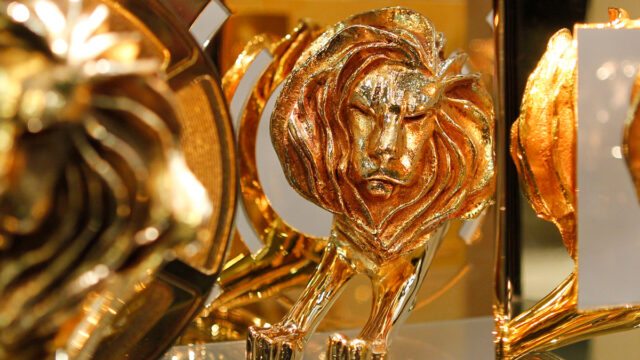Human Creativity Fends Off Gen AI in Cannes Jury Rooms
Never miss a beat: Subscribe to ADWEEK for exclusive Cannes Lions coverage.
CANNES, France—For the second year running, generative artificial intelligence (gen AI) was the hottest topic among the 15,000 delegates at Cannes Lions. However, in jury rooms, judges remained underwhelmed by the creative application of the technology.
When asked during a press conference just how much discussion around AI had taken place in the jury room for the Film Lions, jury president Tor Myhren, Apple’s vice president of marketing communications, said, “None.” He added: “There weren’t a lot of AI [centric] films that made it through. I don’t think we ever really talked about it.”
For the first time, Cannes organizers introduced a compulsory question for entrants to disclose whether and how they’d used AI in their work. “This is to help the jury judge the work fairly, with the full picture,” they explained in a blog post.
At the outset of the week, Pedigree’s “Adoptable by Pedigree” from Colenso BBDO, which used machine learning to transform Pedigree’s digital billboards into adoption notices for local shelter dogs, received the Outdoor Grand Prix.
It looked like a promising start for campaigns rooted in gen AI, but as the festival progressed such entries were left on the judging room floor.
Marco Venturelli, chief creative officer for Publicis Groupe France and CEO and CCO of Publicis Conseil France, was jury president for the Outdoor Lions. He admitted not as many successful nominations leveraged gen AI as anticipated.
“The takeout is that AI is not here to do what we were doing differently, but to empower us to do something that we simply couldn’t do before,” he said.
“Pedigree is the perfect example of something that used it to do something that, just a few years ago, would have been impossible,” Venturelli continued. “That’s the sweet spot: [using AI to] empower creativity to do what before was impossible or unimaginable.”
Over at Palais main stage, it was a tale of two Cannes, where the impact of gen AI on the industry dominated the conversation.
David Droga discussed its power to “cut out” marketing’s “messy middle. Elon Musk said X was using AI to improve its ad targeting capabilities, but this is a common industry application for AI, with Meta and Google having long ago developed AI-powered ad targeting tools.
On the fringes, TikTok debuted an AI-generated influencer and Havas announced plans to invest $400 million in its AI and data practice by 2028.
A tale of two Cannes
Regarding Cannes’ biggest accolades, machine learning was distinctly missing from the case studies.
DoorDash’s Super Bowl 58 ad picked up the Titanium Grand Prix. Elsewhere, the two Grand Prix winners in the Film Lions were “Play it Safe,” a musical ad from The Monkeys (part of Accenture Song Sydney) for Sydney Opera House, and Orange’s “WoMen’s Football,” which went viral for highlighting gender bias in soccer.
The latter campaign had already scooped the Grand Prix in Entertainment for Sport earlier in the week.
Some took Orange’s recognition as a win for generative AI since the creative leaned on the tech to help with conception and to stitch in some of the VFX. However, Youri Guerassimov, joint CEO and CCO at Marcel, told ADWEEK the team ultimately decided the most interesting and accurate approach “wasn’t [to use] AI,” but to rely on real footage.
Debbi Vandeven, global chief creative officer at VML and Titanium Lions jury president, added to the chorus: “A lot of people think the ‘WoMen’s Football’ ad had something to do with AI, and it [didn’t], it just [relied on] visual effects.”
Jouke Vuurmans, chief creative officer at Media.Monks and a juror on the Digital Craft track, said most AI entries lacked “clear purpose or creativity.” Ultimately, Spotify’s “Spreadbeats” by FCB New York took home the Grand Prix in Digital Craft, without any input from machine learning.
However, Vuurmans said AI combined with “soul” did yield some interesting entries, highlighting Deutsche Telekom’s “Ella – Without Consent” campaign, which used a deepfake to trigger debate on sharing photos of children online, as one more “thoughtful application of the technology.”
“AI doesn’t change the judging script. We are still looking for transformative ideas and craft,” he added.
Could he see an AI Lion in Cannes’ future?
“No. AI can and is being used in so many ways. And while it might be tempting to see it as the trend that overshadows other creative, this isn’t the case,” he explained, saying Spotify’s Grand Prix win underscored this.
In 2024, Cannes Lions received over 26,000 entries, of which just 737 were shortlisted.
As the festival draws to a close, delegates may be returning to their desks with a clearer picture of how AI could disrupt the industry, but for creatives, the tech has yet to rattle their trophy cabinets.
https://www.adweek.com/creativity/human-creativity-fends-off-gen-ai-in-cannes-jury-rooms/
